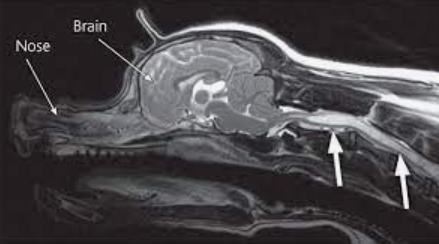
We all know dogs love a good walk, to run, jump and chase. All of these movements depend on a healthy nervous system from the brain, through the spinal cord and out to the nerves around the body. So, why does this become a concern when owning a flat-faced dog? Well, it is widely known that brachycephalic (flat-faced) breeds generally have a compressed skull shape, which can lead to complications of the neurological system. We know that some flat-faced breeds, for example the Cavalier King Charles spaniel, are prone to syringomyelia, a painful condition where cavities or cysts form in the spinal cord.
Other spinal cord diseases include degenerative myelopathy, which usually affects older dogs, and lumbosacral disease, a condition that compresses the nerves at the base of the spine.

Symptoms of neurological disorders
As in many illnesses, many symptoms of neurological disorders mimic those of lesser complicated health issues and can be easily overlooked or missed. It is often not until our pets are in some considerable discomfort, do we realise that there may be more complex reasons for their symptoms. The following list may help you to identify a neurological issue and allow you the time to have it investigated and treated. Early detection of possible nervous system dysfunction is vital to the longer-term options for your dog.
Symptoms
- Disorientation/confusion
- Excessive circling
- Head pressing
- Seizures
- Sudden weakness and/or stumbling
- Muscle weakness
- Pain – your dog may vocalise more and change behaviour
Treatment
If you suspect your dog might have the symptoms described above, it is essential that you seek professional advice from your vet. We know that early detection of neurological issues provides greater options when deciding on a treatment plan.
Treatments can vary widely, from physiotherapy and exercises, even acupuncture, through to surgical options. Sadly, sometimes there is no cure for a neurological disorder and pain management and ensuring the comfort of your dog becomes the priority. In these situations, your vet will be able to discuss the best care plan with you.
Owning a flat-faced dog
Our flat-faced friends provide much love, companionship and fun; and are an adored member of the family they belong to. However, they do require owners to have a high level of awareness of the known health challenges faced by these breeds.
We hope our series of health guides can help you to not only identify the symptoms of these complications, but also signpost you to the most appropriate course of action to safeguard your pet’s wellbeing.
Useful links
RSPCA: https://www.rspca.org.uk/adviceandwelfare/pets/dogs/puppy/pedigreedogs/health
Blue Cross:
https://www.bluecross.org.uk/pet-advice/things-think-about-buying-flat-faced-dog
The Kennel Club:
https://www.thekennelclub.org.uk/health-and-dog-care/what-we-do-for-dog-health/brachycephalic-dogs/
